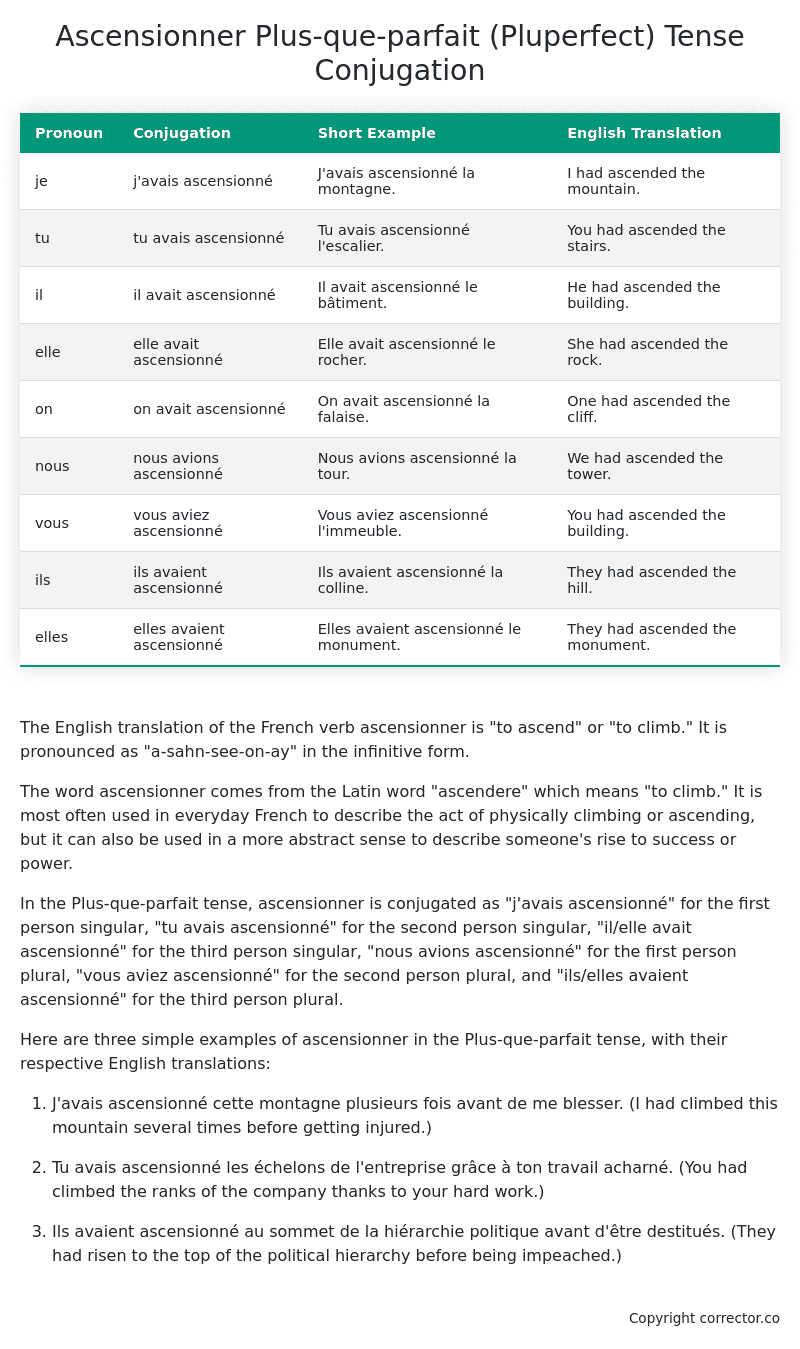Plus-que-parfait (Pluperfect) Tense Conjugation of the French Verb ascensionner
Introduction to the verb ascensionner
The English translation of the French verb ascensionner is “to ascend” or “to climb.” It is pronounced as “a-sahn-see-on-ay” in the infinitive form.
The word ascensionner comes from the Latin word “ascendere” which means “to climb.” It is most often used in everyday French to describe the act of physically climbing or ascending, but it can also be used in a more abstract sense to describe someone’s rise to success or power.
In the Plus-que-parfait tense, ascensionner is conjugated as “j’avais ascensionné” for the first person singular, “tu avais ascensionné” for the second person singular, “il/elle avait ascensionné” for the third person singular, “nous avions ascensionné” for the first person plural, “vous aviez ascensionné” for the second person plural, and “ils/elles avaient ascensionné” for the third person plural.
Here are three simple examples of ascensionner in the Plus-que-parfait tense, with their respective English translations:
-
J’avais ascensionné cette montagne plusieurs fois avant de me blesser. (I had climbed this mountain several times before getting injured.)
-
Tu avais ascensionné les échelons de l’entreprise grâce à ton travail acharné. (You had climbed the ranks of the company thanks to your hard work.)
-
Ils avaient ascensionné au sommet de la hiérarchie politique avant d’être destitués. (They had risen to the top of the political hierarchy before being impeached.)
Table of the Plus-que-parfait (Pluperfect) Tense Conjugation of ascensionner
| Pronoun | Conjugation | Short Example | English Translation |
|---|---|---|---|
| je | j’avais ascensionné | J’avais ascensionné la montagne. | I had ascended the mountain. |
| tu | tu avais ascensionné | Tu avais ascensionné l’escalier. | You had ascended the stairs. |
| il | il avait ascensionné | Il avait ascensionné le bâtiment. | He had ascended the building. |
| elle | elle avait ascensionné | Elle avait ascensionné le rocher. | She had ascended the rock. |
| on | on avait ascensionné | On avait ascensionné la falaise. | One had ascended the cliff. |
| nous | nous avions ascensionné | Nous avions ascensionné la tour. | We had ascended the tower. |
| vous | vous aviez ascensionné | Vous aviez ascensionné l’immeuble. | You had ascended the building. |
| ils | ils avaient ascensionné | Ils avaient ascensionné la colline. | They had ascended the hill. |
| elles | elles avaient ascensionné | Elles avaient ascensionné le monument. | They had ascended the monument. |
Other Conjugations for Ascensionner.
Le Present (Present Tense) Conjugation of the French Verb ascensionner
Imparfait (Imperfect) Tense Conjugation of the French Verb ascensionner
Passé Simple (Simple Past) Tense Conjugation of the French Verb ascensionner
Passé Composé (Present Perfect) Tense Conjugation of the French Verb ascensionner
Futur Simple (Simple Future) Tense Conjugation of the French Verb ascensionner
Futur Proche (Near Future) Tense Conjugation of the French Verb ascensionner
Plus-que-parfait (Pluperfect) Tense Conjugation of the French Verb ascensionner (this article)
Passé Antérieur (Past Anterior) Tense Conjugation of the French Verb ascensionner
Futur Antérieur (Future Anterior) Tense Conjugation of the French Verb ascensionner
Subjonctif Présent (Subjunctive Present) Tense Conjugation of the French Verb ascensionner
Subjonctif Passé (Subjunctive Past) Tense Conjugation of the French Verb ascensionner
Subjonctif Imparfait (Subjunctive Imperfect) Tense Conjugation of the French Verb ascensionner
Conditionnel Présent (Conditional Present) Tense Conjugation of the French Verb ascensionner
Conditionnel Passé (Conditional Past) Tense Conjugation of the French Verb ascensionner
L’impératif Présent (Imperative Present) Tense Conjugation of the French Verb ascensionner
L’infinitif Présent (Infinitive Present) Tense Conjugation of the French Verb ascensionner
Struggling with French verbs or the language in general? Why not use our free French Grammar Checker – no registration required!
Get a FREE Download Study Sheet of this Conjugation 🔥
Simply right click the image below, click “save image” and get your free reference for the ascensionner Plus-que-parfait tense conjugation!

Ascensionner – About the French Plus-que-parfait (Pluperfect) Tense
Tense Formation
Common everyday usage patterns
Sequencing of past events
Background information
Hypothetical or reported speech
Interactions with other tenses
Summary
I hope you enjoyed this article on the verb ascensionner. Still in a learning mood? Check out another TOTALLY random French verb conjugation!


